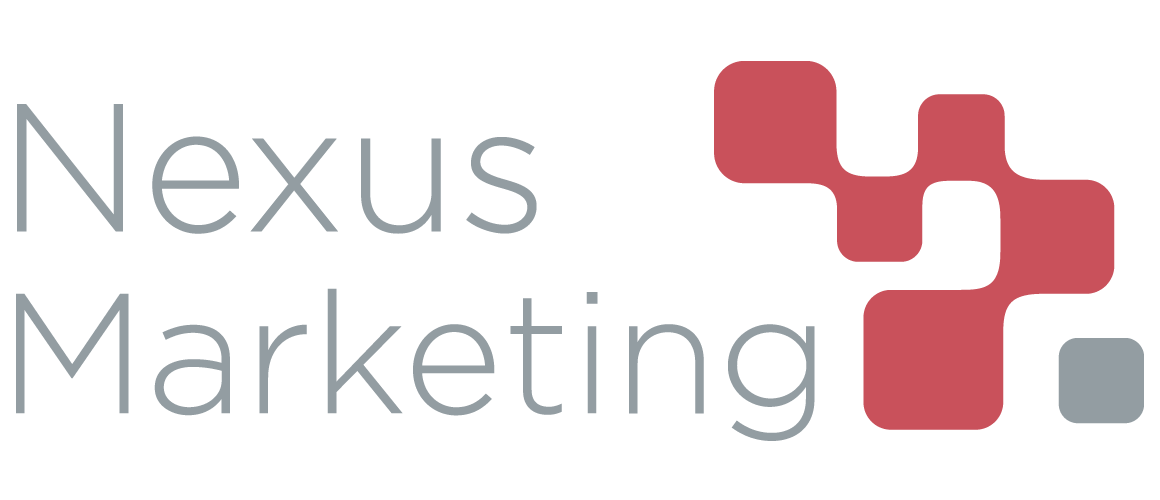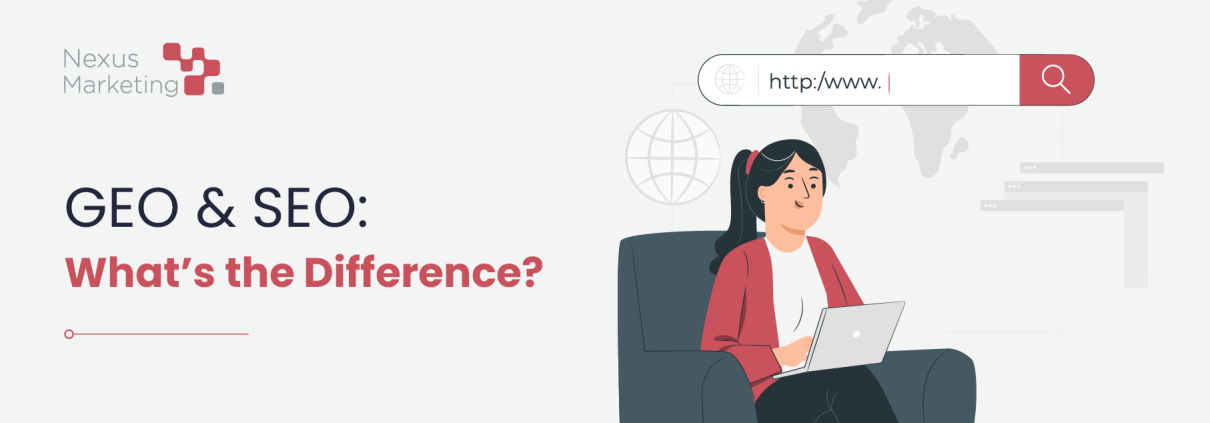Generative Engine Optimization (GEO) & SEO: What’s the Difference?
If your brand has already invested time and resources into an SEO strategy (or wants to), you probably have a few tactical questions about the new concept of increasing AI visibility through Generative Engine Optimization (GEO).
How does GEO relate to SEO? How are they different? If you invest in one, should you invest in the other?
Here, we’ll explore the relationship between these two fields of digital marketing, starting with quick overviews of what each involves and accomplishes.
Spoiler: A solid SEO foundation positions your brand to thrive with GEO and maximize its benefits.
New to GEO? Check out our longer explainer, Generative Engine Optimization (GEO) Scorecards Explained, for a complete introduction to GEO and how we approach it at Nexus Marketing.
What is SEO?
Search Engine Optimization (SEO) is the broad set of practices that brands use to improve their visibility in search results. By appearing highly and more frequently for the keywords their audiences are searching, brands can attract more leads and grow their brand presence online.
Key practices of SEO include:
- Technically optimizing your website to perform well for users and search engine crawlers
- Creating expert, authoritative, trustworthy content that users and search engine crawlers find valuable
- Building backlinks to your content across the web to further demonstrate trustworthiness
Key objectives of SEO include:
- Increasing rankings and therefore visibility for specific search queries aligned with your target audience
- Engaging and converting those users once they arrive on your site
What is GEO?
Generative Engine Optimization (GEO) is the process of optimizing your website and content strategies to ensure legibility to AI-powered LLM search tools, like ChatGPT.
These tools work a little differently than traditional search engine crawlers. They seek to understand the distinct “entities” present on your website, like your brand, products, areas of expertise, and subject matter experts, and how those entities relate. When LLMs easily understand your website, it will be more likely to be cited and shown to users on those platforms, filling a growing gap in how potential customers find information today.
Key practices of GEO include:
- Implementing schema markup to clearly label the entities on your website
- Ensuring consistent representations of your key entities (products, people, brand propositions, etc.) across your website and other websites
- Creating high-value content that stands out to LLMs and warrants citation in their results
- Building a robust off-site presence of industry publications, brand mentions, speaking engagements, and more
Key objectives of GEO include:
- Securing citations in LLM search results for relevant queries
- Encouraging clickthroughs from LLM users exposed to your content so that they’ll visit your website and potentially convert
We recently completed a GEO audit and improvements to help Double the Donation increase their AI visibility—by 300%!
Check out the case study for a real example of GEO in action.
How do SEO and GEO compare?
Let’s more directly compare SEO and GEO. Here’s how we think about their key differences:
| SEO | GEO | |
| Purpose | To improve a website’s rankings in search engine results and drive visibility among target audiences. | To ensure a brand or thought leader is accurately recognized and perceived as authoritative by LLMs, resulting in greater visibility across AI-generated responses. |
| Scope | Primarily domain-focused, usually emphasizing the optimization of a single website’s content and backlinks. | Encompasses the overall brand’s digital footprint and authority as a recognized entity across the various data sources that LLMs reference. |
| Shared On-Site Practices | Using content structure to create AI and crawler-friendly content; using common, conversational language for questions; in-depth content; leveraging E-E-A-T (Experience, Expertise, Authoritativeness, Trustworthiness); emphasis on quality over quantity | |
| Shared Off-Site Practices | Building site and brand authority, establishing trust signals from other relevant sources and websites | |
| Unique Practices | Combines on-site, on-page, and off-site strategies to maintain site health, create high-quality content, and build backlinks. | Builds on SEO fundamentals while emphasizing technical elements like schema markup, consistent entity data, and a strong off-site presence (on other websites, LinkedIn, Google Business Profiles, etc.) |
| Measurement | Well-developed ecosystem of tools to track keyword rankings and monitor traffic and conversions associated with the channel. | Earlier-stage measurement tools that can capture at least part of the impact of AI search on the buying journey |
To sum up:
- GEO can be thought of as more holistic or further-reaching than SEO.
- GEO builds on SEO fundamentals, taking a broader view of the brand while also layering in additional technical and offsite practices.
- Both SEO and GEO share common goals of building visibility and trust. If you have a solid SEO presence, you’ve already begun establishing that visibility.
- Both SEO and GEO strategies rely on high-quality, EEAT content that warrants attention from users, search engines, and LLMs.
SEO is the foundation for GEO
Brands already investing in SEO are ahead of the curve when it comes time to increase their AI visibility through GEO.
SEO helps to establish all of the core practices that GEO builds upon. By establishing a foundation of technical health, content quality, and offsite visibility for your website, your website is already primed for GEO success and recognition by LLMs.
Keep in mind that search engines have become much more advanced in recent years. Rather than the old keyword-heavy approach, today’s successful SEO content is more adaptable, unique, and tailored to the audience. This is the kind of content that LLMs want to prioritize, too. So, if you already see success with your SEO content (whether DIY or written by our team), it’s already positioned to succeed in the GEO field.
And if you work with Nexus, you already have access to one of our key differentiators—our expansive network of industry partners.
GEO places a more holistic emphasis on off-site brand building, like through speaking engagements. Our publishing partners help spread your thought leadership, while NXUnite panels and other opportunities make it easy to boost your brand in new ways that LLMs are sure to recognize.
Bottomline: New or continued investment in SEO will support and boost your GEO results.
Additional GEO strategies are likely to gain traction quickly when you have a solid foundation of site health, visibility, and quality content.
On the flipside, attempting to boost GEO without laying this foundation is likely to yield poorer results.
Taking your first steps into GEO
For B2B brands already investing in SEO, GEO is the natural next step to ensure your digital presence keeps pace with the AI revolution.
But how do you get started?
We recommend these foundational steps that you can try for yourself with a little research:
- Audit Schema Markup: Ensure schema markup on your website is accurate, complete, and includes key details like product categories, business locations, and team bios.
- Ensure Entity Consistency: Standardize brand information—address, phone number, and descriptions—across platforms like LinkedIn, Google Business, and directories. Even small discrepancies can disrupt your visibility.
- Create Authoritative Content: Publish thought leadership that demonstrates your expertise. Educational guides, guest blogs, whitepapers, webinars, and case studies are especially effective for bolstering both SEO and GEO.
When it comes to writing content for your website, there are a few additional strategies to ensure maximum legibility to both search engines and LLMs. Here’s how our team approaches it:
| AI-friendly writing for quality responses | Conversational Language: We craft content that flows naturally, aligning with how AI like ChatGPT responds to user queries. |
| Engaging & Informative: Quality content keeps users interested and positions your brand as an approachable authority. | |
| Using common language for questions | Answering FAQs: We cover common customer questions, making your brand the go-to for AI-assisted answers via people also ask boxes / FAQs. |
| Topic Optimization: Beyond keywords, we optimize broader topics to match how AI interprets user intent. | |
| In-depth content | In-Depth, Theme-Based Content: AI values context, so we create comprehensive content to make your brand relevant in AI responses. |
| Leveraging E-E-A-T | Trust & Accuracy: Data-backed content reinforces brand trustworthiness for AI-driven queries. |
| Site authority and trust signals | Domain Authority: Strong backlinks and positive mentions via websites in your industry enhance your site’s credibility, increasing the likelihood of selection by AI models. |
| Social Proof: Customer stories further validate your brand, helping AI recognize it as a reliable source. | |
| Consistent Quality: High engagement metrics and well-maintained external signal to AI that your site is a trusted, valuable resource. |
We can help you launch a GEO strategy.
It’s no secret that maintaining a consistent SEO strategy and creating quality content to fuel it are hard work. GEO brings challenges, too—some of its key practices are much more technical than those of traditional SEO. It’s also just plain new.
If you’re short on time or know-how, we can help with both your SEO and GEO strategies.
With our comprehensive GEO scorecards, we can lay out and execute a fully customized roadmap for improving your website’s AI-friendliness. Your custom GEO audit and improvements paired with ongoing SEO support and content creation will prime your brand to thrive in today’s rapidly changing internet.
Don’t wait for AI to redefine what it means to be visible online—stay ahead by embracing strategies that position your brand for long-term success.
Are you ready to optimize your digital presence for the generative era? Please contact your Nexus account manager to ask about assessing your AI readiness with our new tools.
Not yet an SEO client? We’d love to hear from you! Contact us to tell us a bit about your digital marketing needs.




